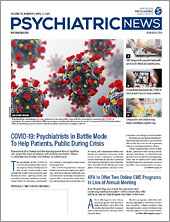Medicare patients seeking certain medical services—including mental health services—can now be seen via live video chats in their homes. They do not need to travel to a qualifying “originating site” for Medicare telehealth encounters, regardless of geographic location, according to a guidance issued March 17 by the Centers for Medicare and Medicaid Services (CMS).
CMS is temporarily expanding Medicare telehealth services and waiving existing restrictions on those services under authority granted to the Secretary of Health and Human Services (HHS) in the bipartisan Coronavirus Preparedness and Response Supplemental Appropriations Act approved by Congress and signed by President Donald Trump on March 6. The new guidance is intended to protect patient health and slow the transmission of COVID-19 by allowing patients to receive care without leaving home.
One week following passage of the bill, President Trump declared the COVID-19 pandemic a national emergency. Under that emergency declaration, Medicare coverage will now include three types of virtual services: Medicare telehealth visits, virtual check-ins, and e-visits.
Additionally, for the duration of the emergency, HHS is waiving HIPAA penalties for using non-HIPAA compliant videoconferencing software. This will allow physicians and other health care professionals to use popular technology, such as Skype (basic) and FaceTime to conduct telehealth sessions. The federal Office of Civil Rights has released further guidance about the HIPAA penalty waiver.
When conducting a telemedicine encounter, health care professionals should use the same CPT codes as for in-person encounters, but with the Place of Service (POS) code 02 to indicate the care was provided via telemedicine. Psychiatrists considering transitioning patients to telepsychiatry in place of in-person appointments should consult APA’s Telepsychiatry Toolkit, which includes videos and guidance on topics related to telepsychiatry, including clinical considerations, administrative and technical requirements for software issues, and reimbursement.
Physicians providing telepsychiatry services need a license in the state in which the patient is located at the time services are provided. However, many governors are declaring states of emergency, which may result in altering or waiving these restrictions. The Federation of State Medical Boards (FSMB) has posted a list of states that have declared emergencies and waived a variety of licensing restrictions. APA is monitoring state-level activities and will disseminate information as soon as there is definitive guidance for members in those states.
Finally, the Drug Enforcement Administration lifted existing requirements that a health care professional conduct an initial, in-person examination of a patient—thereby establishing a doctor-patient relationship—before electronically prescribing a controlled substance. For the duration of the emergency, that requirement will not apply.
The emergency actions temporarily lift a number of restrictions that usually apply to where and under what circumstances patients can receive telehealth services. Generally, Medicare beneficiaries may receive telehealth services under Medicare only if they are located in a qualifying rural area and at one of eight types of qualifying originating sites. In 2018, Congress passed the SUPPORT Act, which removed the Medicare originating-site restrictions for patients with substance use disorders with or without a co-occurring mental health disorder. This change allowed patients to receive telehealth services at home. However, the telemedicine restrictions remained in place for patients with mental health disorders but no co-occurring substance use disorder.
The bipartisan bill granted authority to the HHS secretary to lift that restriction and others but did not actually do so. That was accomplished by HHS’s March 17 guidance.
The $8 billion spending bill substantially exceeded the $2.5 billion originally requested by the Trump administration. It provided $7.76 billion to federal, state, and local agencies to combat the coronavirus—including more than $3 billion for vaccine research—and authorized an additional $500 million to meet the demand created by waiving the restrictions.
Prior to passage of the March 6 bill, APA CEO and Medical Director Saul Levin, M.D, M.P.A., had urged Congress to remove restrictions on using telehealth for mental health services in a letter to Congressional leaders. He and other APA leaders welcomed the Trump administration’s actions.
“We are in an extraordinary crisis, and the administration has done the right thing,” Levin said. “Now, Medicare beneficiaries who may be at risk of contracting COVID-19 can be seen in their homes via telepsychiatry and maintain their regular course of therapy without disruption. This will also minimize future infections.”
APA President Bruce Schwartz, M.D., agreed. “Telehealth and telepsychiatry in ordinary times can help more people access services that are critical to their well-being,” Schwartz said in a statement. “But it is especially important now, given the nature of COVID-19. Particularly for some groups, like senior citizens and other vulnerable populations, access to telepsychiatry and telehealth could be vital.”
A fact sheet from CMS about the guidance is posted
here.
The Drug Enforcement Administration notice is posted
here.
The FSMB list of states that have declared emergencies is posted
here.
APA’s Telepsychiatry Toolkit is posted
here.
Additional resources are posted
here.

